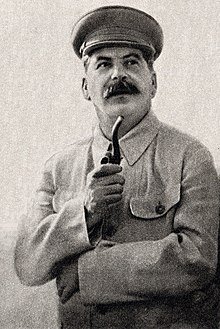Joseph V. Stalin
| Joseph Stalin | |
|---|---|
| Иосиф Сталин (Russian) იოსებ სტალინი (Georgian) |
|

Stalin in 1937
|
|
| General Secretary of the Communist Party of the Soviet Union | |
|
In office 3 April 1922 – 16 October 1952 |
|
| Preceded by |
Vyacheslav Molotov (as Responsible Secretary) |
| Succeeded by |
Nikita Khrushchev (as First Secretary) |
| Chairman of the Council of Ministers | |
|
In office 6 May 1941 – 5 March 1953 |
|
| First Deputies |
Nikolai Voznesensky Vyacheslav Molotov Nikolai Bulganin |
| Preceded by | Vyacheslav Molotov |
| Succeeded by | Georgy Malenkov |
| Personal details | |
| Born |
Ioseb Besarionis dze Jughashvili 18 December 1878 Gori, Tiflis Governorate, Caucasus Viceroyalty, Russian Empire |
| Died | 5 March 1953 (aged 74) Kuntsevo Dacha, Kuntsevo, Russian SFSR, Soviet Union |
| Resting place |
Lenin's Mausoleum, Moscow (9 March 1953 – 31 October 1961) Kremlin Wall Necropolis, Moscow (from 31 October 1961) |
| Nationality | Soviet |
| Political party | Communist Party of the Soviet Union |
| Spouse(s) |
Ekaterine Svanidze (1906–07) Nadezhda Alliluyeva (1919–32) |
| Children |
Yakov Dzhugashvili Konstantin Kuzakov Vasily Dzhugashvili Svetlana Alliluyeva |
| Parents | Besarion Jughashvili and Ekaterine Geladze |
| Signature |  |
| Military service | |
| Nickname(s) | Koba |
| Allegiance |
|
| Service/branch | Soviet Armed Forces |
| Years of service | 1943–53 |
| Rank | Marshal of the Soviet Union (1943–45) |
| Commands | All (supreme commander) |
| Battles/wars | World War II |
|
Central institution membership
Other offices held
|
|
Joseph Vissarionovich Stalin (18 December 1878 – 5 March 1953) was a Soviet revolutionary and politician of Georgian nationality. Governing the Soviet Union from the mid-1920s until his death in 1953, he served as General Secretary of the Central Committee of the Communist Party of the Soviet Union from 1922 to 1952 and as the nation's Premier from 1941 to 1953. Initially the head of a collective party elite that governed by consensus, he ultimately removed his rivals and accumulated power to become the Soviet Union's de facto dictator by the late 1930s. Ideologically a Marxist and a Leninist, Stalin helped to formalise these ideas as Marxism–Leninism while his own policies became known as Stalinism.
Born to a poor family in Gori, Russian Empire, Stalin began his revolutionary career in his youth by joining the Marxist Russian Social Democratic Labour Party. There, he edited the party's newspaper, Pravda, and raised funds for Vladimir Lenin's Bolshevik faction via robberies, kidnappings, and protection rackets. Repeatedly arrested, he underwent several internal exiles. After the Bolsheviks seized power in Russia during the 1917 October Revolution, Stalin joined the party's governing Politburo where he was instrumental in overseeing the Soviet Union's establishment in 1922. Despite Lenin's opposition, he assumed leadership over the country shortly after the former's death in 1924. During Stalin's rule, "Socialism in One Country" became a central tenet of the party's dogma, and Lenin's New Economic Policy was abandoned in favour of a centralized command economy. Under the Five-Year Plan system, the country underwent rapid industrialization but also experienced significant disruptions in food production that contributed to the famine of 1932–33. To eradicate those regarded as "enemies of the working class", Stalin instituted the "Great Purge" in which over a million were imprisoned and at least 700,000 were executed from 1934 to 1939.
...
Wikipedia
